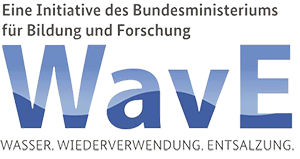Pilot plant for selective desalination starts operating on Langeoog
The time has finally come: the selective desalination process is now being tested under practical conditions at the waterworks of the OOWV on Langeoog. The project partners from the BMBF-funded joint project innovatION met on Langeoog to commission the pilot plant.
For the practical tests, DEUKUM GmbH built a pilot plant together with elkoplan staiger GmbH, which can desalinate up to 100 l/h of water. However, this is not a conventional full desalination system, but a selective electrochemical partial desalination system. Selective desalination can be achieved using modified membranes, which have been developed by the Leibniz Institute for Polymer Research Dresden e.V. and FUMATECH BWT GmbH over the last three years, as well as with adapted process parameters. With the help of selective desalination, brackish water can also be used as an alternative resource for drinking water production. In the partial desalination process on Langeoog, only sodium and chloride are to be removed from the brackish water, leaving calcium and magnesium in the water. The pilot plant on Langeoog can now also be used to analyze the long-term behavior. There have hardly been any studies on this so far, but they are crucial for product development.
So far, the process has been tested on a small scale at the Chair of Process Engineering in Hydro Systems at TU Dresden. The innovative membranes and various process settings were tested here on a laboratory scale and a flow and process model was set up. The laboratory tests showed that the selectivity depends on the electrical voltage, the flow rate, the residence time and the cell structure. Due to the different mobility of polyvalent and monovalent ions, Axel Staiger from elkoplan staiger GmbH has generated an innovative electrical pulse process that should further support selectivity during desalination.
As the freshwater bubble on Langeoog is surrounded by saline water, the Hydrogeology and Landscape Water Balance working group at the Carl von Ossietzky University of Oldenburg is also investigating whether the partially desalinated water is also suitable for recharging the groundwater. The results of the soil column tests show that partially desalinated water is more suitable for infiltration than fully desalinated water due to reduced mobilization effects.
Following the trials on Langeoog, the pilot plant will also be tested at the Nienburg District Association for Water Management in order to investigate the selective removal of nitrate.
You can find the complete WavE newsletter here:
https://bmbf-wave.de/Publikationen/Newsletter.html



